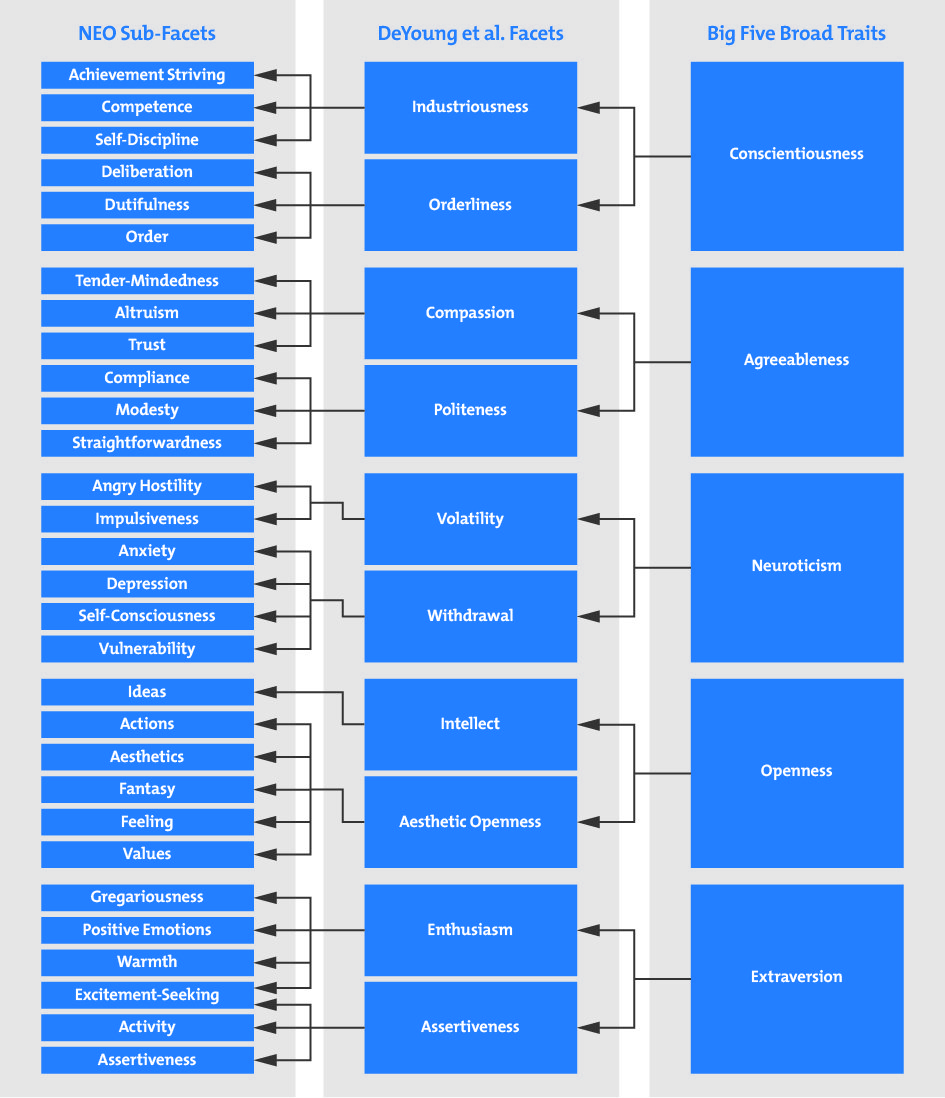The Big 5 Personality Traits, also called the OCEAN model or the five-factor model, are used to describe someone’s personality in broad traits that are common to everyone. These traits are:
- Openness
- Conscientiousness
- Extroversion
- Agreeableness
- Neuroticism
For decades, psychologists have researched personality traits to link them to behaviours and results. The Big 5 model started in the early 60s with Tupes and Christal, two psychologists who wanted to understand how these traits were linked to academic performance. Since then many psychologists have worked on this model to extend its reach and develop new methods.
These 5 traits are not the only element to take into consideration when exploring behaviours. Many other internal (the person’s experience, background, etc.) and external factors (the current context the person lives in) also impact it.
Each trait has a spectrum where you can place yourself. You can be more or less of each trait; you can tend towards one end or the other depending on your natural inclination to certain factors. If you are in the middle, you do not have any strong preferences and are considered to be adaptable.
The five factors
Openness
High scorers tend to be original, creative, curious, complex. They are open to new things and focus on new challenges. On the other hand, low scorers tend to be conventional, down to earth, have narrow interest and are not very imaginative. They tend to dislike change and resit new ideas.
Conscientiousness
High scorers tend to be reliable, well-organized and self-disciplined. They usually pay attention to details and are very thoughtful. Low scorers tend to not be interested in many things, they also tend to be disorganized and procrastinate important tasks.
Extroversion
High scorers tend to be sociable, friendly, fun loving and talkative. They openly express their emotions and are outgoing. Low scorers tend to be reserved, introverted and quiet. They carefully think because speaking, they dislike being the center of attention and prefer solitude.
Agreeableness
High scorers tend to be good natured, sympathetic and forgiving. They tend to be kind, affectionate and altruist. They care about and enjoy helping others. Low scorers tend to be critical, rude, and harsh. They have little interest in others and tend to be competitive.
Neuroticism
Neuroticism is a trait characterized by sadness, moodiness, and emotional instability. High scorers tend to be nervous and insecure. They worry about many things, feel anxious, and tend to struggle to bounce back after setbacks. Low scorers tend to be calm, emotionally stable, relaxed and secure. They tend to handle stress well and rarely feel sad or depressed.
Now take the test here (you don’t have to fill in all the personal information. Just click on the button “submit” when you have answered the 60 questions and you’ll get your score).
After doing the questionnaire, you should have a clearer idea of how you rank on each trait. The document below, shown on Mindtools, shows a breakdown of the 5 traits into 10 facets, which are then broken down into 30 sub-facets. This gives you additional information to understand better the characteristics.

Judge, T.A., et al. (2013). ‘Hierarchical Representations of the Five-Factor Model of Personality in Predicting Job Performance: Integrating Three Organizing Frameworks With Two Theoretical Perspectives,’ Vol. 98, No. 6, 875-925, 2013, published by American Psychological Association, Inc
Using it in the workplace
Taking this test is a good first step to build self-awareness about the traits that you show more than others. Like for any other personality test, it is important to remember that:
- It’s a picture at a given moment that may change with new experiences.
- It’s subjective as you are the one filling it.
- It highlights behaviours and natural preferences, not who you are as a person.
Regardless of its potential fallibility, if you recognise yourself in the results, there is a part of truth that is worth considering for your personal development and career growth.
1. Explore the 5 traits, the 10 facets and 30 sub-facets
Identify the traits you scored the highest and the ones where you scored the lowest. Notice if you have any in the middle, which would indicate you don’t have any preference towards one or the other. What do you think about these results? Do they seem right to you?
Looking at the table I shared with the different facets, break down each trait to see what facet/sub-facet is relevant to you. Which ones are holding you back? Which ones would you like to start improving now? This type of questions is a great starting point to reflect on what you want to do with these results and what actions you can take for your career development.
2. Have your team and manager take the test
Another way to use this form is make your team and manager take it. Share the gift of self-awareness with others. There is a benefit for you too. One of the emotional intelligence skills is social awareness, that is being aware of people around you, their individual differences, but also how you all form a group with specific dynamics and routines. Having people you work with take that role and share the results (see point #3 below) will help you understand them better and adjust your behaviours if/when necessary.
3. Create a team discussion about the results
Have the team share the results in an informal team meeting where you can discuss:
- Where you are different and complementary
- Where you are similar
- How communication can be improved
- How these traits in each of you contribute to your team’s successes and/or difficulties
You can also provide examples and feedback to people as they share their results, and have them do the same with you. After all, these people are working with you every day and should have a good understanding of who you are at work, and what perception you give.
Sources
- https://www.thoughtco.com/big-five-personality-traits-4176097
- https://www.healthline.com/health/big-five-personality-traits
- https://www.mindtools.com/pages/article/newCDV_22.htm
- https://www.verywellmind.com/the-big-five-personality-dimensions-2795422
- https://bigthink.com/robby-berman/the-5-personality-types-and-why-you-care
- https://en.wikipedia.org/wiki/Big_Five_personality_traits

